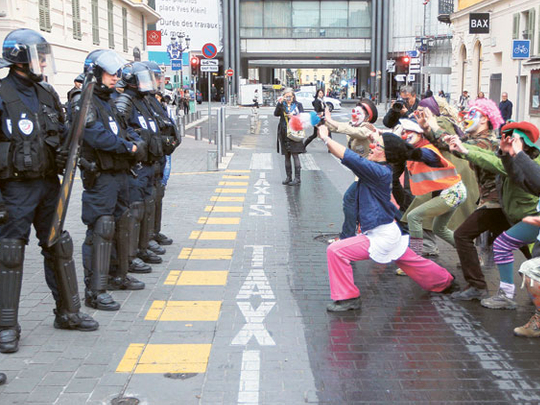
Cannes: Europe's financial turmoil deepened, dominating a Group of 20 summit, as Greece's government veered toward collapse and Italy came under renewed pressure to prove its credit-worthiness.
Greek Prime Minister George Papandreou clung to power after signalling the abandonment of a referendum on bailout terms that had triggered a suspension of European aid. Italian Prime Minister Silvio Berlusconi was pushed by German Chancellor Angela Merkel to accelerate an austerity drive as his country's bond yields jumped to a euro-era record.
The hardball tactics toward Europe's crisis-ridden countries underscored the urgency for world leaders meeting in the French resort of Cannes to solve the two-year-old debt woes weighing on the global economy. The European Central Bank offered relief with an unexpected interest-rate cut as its new president, Mario Draghi, said the euro area was facing a recession.
"The most important aspect of our task over the next two days is to resolve the financial crisis here in Europe," US President Barack Obama told reporters in Cannes between one-on-one meetings with Sarkozy and Merkel.
On a day of political sparring in Europe's most indebted state, Papandreou squared off with rebels in his own party over the referendum that European officials insisted would determine whether Greece stays in the euro or quits.
Athens split
The uproar in Athens broke out early with Fin-ance Minister Evangelos Venizelos splitting with his boss over whether the early December ballot might lead to a euro exit. Papandreou "is history," Dimitris Lintzeris, a ruling-party lawmaker, said on NET TV as lawmakers debated whether to support his administration in a confidence vote tomorrow.
The Greek leader's call for a poll on the terms of the rescue package failed to inspire confidence. Greek two-year bond yields climbed above 100 per cent for the first time yesterday. By late afternoon, Papandreou floated the prospect of forming a unity government with opposition leader Antonis Samaras, who had sought to capitalise on voter discontent with two years of austerity and a deepening recession.
Europe and the International Monetary Fund made cross-party support for budget cuts a condition for paying out the next €8 billion (Dh40.8 billion) of Greek aid, the sixth installment in the €110 billion-package awarded at the outbreak of the crisis in May 2010.
Breaking with the doctrine that there is no way out of the euro, Merkel and Sarkozy cornered the Greek leader last night in Cannes on the eve of the G20 summit and transformed the planned vote into an up-or-down decision on whether Greece would stay in the currency union.
"We would like Greece to remain a member but we're not saying Greece has to stay a member at all costs," Luxembourg Prime Minister Jean-Claude Juncker, who chairs meetings of euro finance ministers, said yesterday on ZDF German television.
Rescue fund
As they huddled again in Cannes this morning, Europe's chiefs pledged to speed up a plan to boost the power of their €440 billion-rescue fund to stop Greece's travails from spreading to other cash-strapped economies such as Italy. Leaders agreed a week ago to use leverage to beef the fund's clout up to €1 trillion and told banks to raise €106 billion by the end of June to fortify their capital.
Italy, meanwhile, was back in the spotlight with an increase in its 10-year bond yield to 6.3 per cent, more than triple Germany's. The euro area's third-biggest economy has its second-largest debt burden after Greece and has grown more slowly than the region average in each of the last 10 years.
Arriving in Cannes, Berlusconi and Finance Minister Giulio Tremonti were told by Merkel to press ahead with budget- balancing measures.












